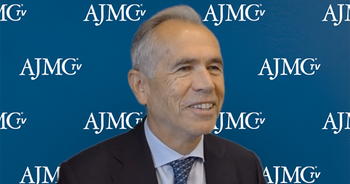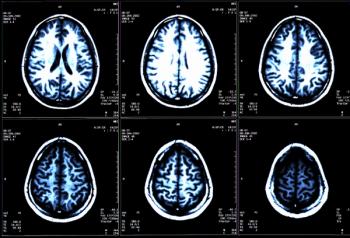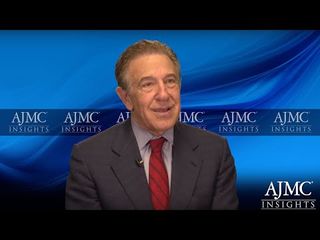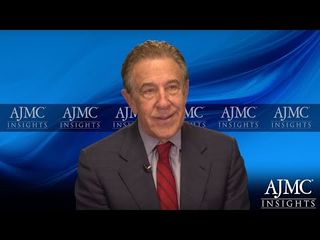
Multiple Sclerosis
Latest News

Latest Videos

CME Content
More News

Alberto Ascherio, MD, DrPh, professor of epidemiology and nutrition at the Harvard T. H. Chan School of Public Health and professor of medicine at the Harvard Medical School, discusses the fact that, in addition to other modifiable factors linked with progression of multiple sclerosis (MS), dietary factors are also emerging as potentially related to outcomes.

Melinda Magyari, MD, PhD, consultant neurologist, the Danish Multiple Sclerosis Center, Copenhagen University Hospital, explores what data registry have shown about factors that are linked with secondary progression in pediatric multiple sclerosis (MS).

MS is a difficult disease to diagnose as it can present in many different ways and lacks an attributable biomarker to assess, said Andrew Solomon, MD, associate professor of neurological sciences and division chief of multiple sclerosis at Larner College of Medicine, The University of Vermont, Burlington, Vermont.

The painless procedure is still in its experimental stages; however, it is inexpensive and safe, and the equipment is portable.

Alberto Ascherio, MD, DrPh, professor of epidemiology and nutrition at the Harvard T. H. Chan School of Public Health and professor of medicine at the Harvard Medical School, discusses the current state of knowledge on smoking and multiple sclerosis (MS) risk and the risk of MS progression.

The first disease-modifying therapies were introduced in the United States and Canada in the 1990s.

Melinda Magyari, MD, PhD, consultant neurologist, the Danish Multiple Sclerosis Center, Copenhagen University Hospital, addresses the current state of knowledge on using disease-modifying therapies to treat children with multiple sclerosis (MS).

Every week, The American Journal of Managed Care® recaps the top managed care news of the week, and you can now listen to it on our podcast, Managed Care Cast.

This week, the top managed care news included research that may hold the key to slowing progression of multiple sclerosis; Humana says it is saving billions of dollars through value-based care; the challenges of rural healthcare delivery.



Alberto Ascherio, MD, DrPh, professor of epidemiology and nutrition at the Harvard T. H. Chan School of Public Health and professor of medicine at the Harvard Medical School, discusses the role of vitamin D insufficiency in the risk of multiple sclerosis (MS) and the optimal dose of vitamin D for patients with MS.

Researchers may have identified a way to delay the progression of multiple sclerosis (MS) by blocking a molecule that controls the entry of B cells into the brain, which results in deterioration of tissue.

Melinda Magyari, MD, PhD, consultant neurologist, the Danish Multiple Sclerosis Center, Copenhagen University Hospital, discusses the current body of data on treating pediatric multiple sclerosis (MS).

Multiple sclerosis (MS) is known to be associated with lower health-related quality of life, and a new study adds evidence that depression and fatigue are the major drivers of this relationship.

Alberto Ascherio, MD, DrPh, professor of epidemiology and nutrition at the Harvard T. H. Chan School of Public Health and professor of medicine at the Harvard Medical School, explains that, in addition to known environmental factors that affect multiple sclerosis (MS) risk, novel factors, such as childhood obesity, are also emerging.

Researchers have identified complement genes that appear to play a role in vision loss associated with multiple sclerosis (MS), and this finding could help researchers monitor and predict the progression and severity of MS, according to a study published in Brain.

Melinda Magyari, MD, PhD, consultant neurologist, the Danish Multiple Sclerosis Center, Copenhagen University Hospital, explains the treatment paradigm for pediatric-onset multiple sclerosis (MS).

As the number of disease-modifying therapies available for multiple sclerosis increases, patients and physicians can struggle to identify the right one for the right patient, highlighting the need for a patient decision aid.

The FDA today approved Biogen and Alkermes’ diroximel fumarate, an oral agent, to treat relapsing forms of multiple sclerosis (MS), including clinically isolated syndrome, relapsing-remitting disease, and secondary progressive disease. The drug, approved under the 505(b)(2) regulatory pathway on the basis of its bioequivalence to dimethyl fumarate (Tecfidera), will be sold as Vumerity.

Jan Hillert, MD, PhD, professor and senior physician in the department of clinical neuroscience, Karolinska Institutet, Stockholm, Sweden, discusses whether the medical community has reached a consensus on using an escalation approach to treatment or starting with highly effective therapies in treating multiple sclerosis (MS).

Serum neurofilament light chain is associated with brain atrophy and disability worsening, which means it can be used as an objective surrogate of ongoing disease activity in multiple sclerosis (MS), according to research published in JAMA Neurology.

Patients with multiple sclerosis (MS) have a higher risk in general of infections, but the risk varies depending on their treatment, according to a new study in JAMA Neurology.

Jan Hillert, MD, PhD, professor and senior physician in the department of clinical neuroscience, Karolinska Institutet, Stockholm, Sweden, discusses the body of knowledge on using stem cell transplants to treat patients with multiple sclerosis (MS).

Two abstracts presented at ECTRIMS 2019, the 35th Annual Congress of the European Committee for Treatment and Research in Multiple Sclerosis, looked at patterns among patients newly diagnosed with multiple sclerosis (MS).

















